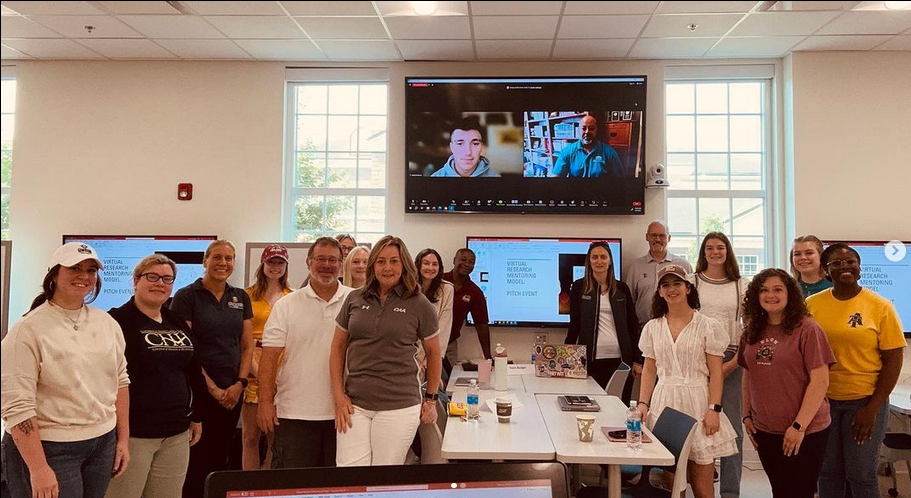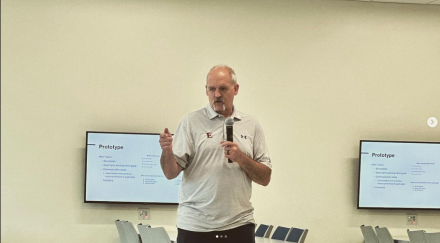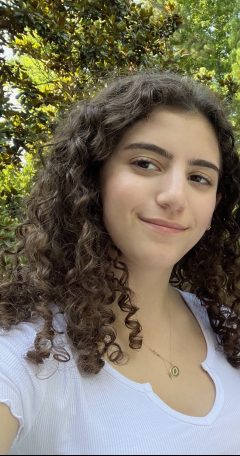Mark Dobson '24 and Olivia Halperin '26 are CAA Health Science Research Scholars, a program aimed at increasing high-quality undergraduate research and mentoring. They and Elon faculty attended a summer workshop to strengthen virtual mentoring experiences.

Elon University is one of three institutions participating in the Coastal Academic Alliance’s Health Science Research Scholars Program, with two exercise science majors selected as scholars in the program’s first cohort.
Mark Dobson ’24 and Olivia Halperin ’26 are each pursuing undergraduate research in the Department of Exercise Science. Dobson is exploring relationships between concussions and mental health in neurodiverse athletes with Professor of Exercise Science Caroline Ketcham. Halperin is part of a team piloting research around stress factors and the menstrual cycle in collegiate athletic performance with her mentor, Associate Professor of Exercise Science Titch Madzima.
Initially founded in 2002 to academically link the member institutions of the Coastal Athletic Association, the alliance facilitates collaboration and communication across member institutions. The Health Science Research Scholars Program aims to encourage undergraduates to pursue health science research and training through dedicated faculty mentoring. Scholars receive a $1,000 stipend and their faculty mentors receive a $500 stipend to advance research and mentoring.

The University of North Carolina – Wilmington is the primary recipient of the CAA’s Enhancing Research for Online Learners (EnROLL) grant funding the research scholars program, with Elon and N.C. A&T State University joining the pilot. Five undergraduates from those schools were selected as research scholars.
Eric Hall, professor of exercise science and director of undergraduate research, is Elon’s principal investigator. He said the program exists to encourage more undergraduate research opportunities and strengthen virtual mentoring so that research experiences are accessible to more students across CAA institutions.
“We’re thinking deeply about relationships, how to form them, how they’re important and how we can make sure these are high-quality experiences in online contexts,” Hall said. “We’re looking to scale this up and provide models for high-quality online mentorship across institutions, to remove barriers to undergraduate research and make it more inclusive.”
Halperin said the research scholars program is part of a robust network of support for undergraduate research she discovered at Elon in her first year. She assumed she would eventually undertake a research project, but was surprised at how quickly and openly faculty embraced her interests and curiosity.

“I’ve loved that I got involved with research this early. I didn’t think I would be involved with it my first year,” Halperin said.
A lifelong soccer player sidelined by a career-ending injury, she is also excited to participate in a study of women soccer players with Madzima, Ketcham and Katie Lowe ’24, a member of the Phoenix women’s soccer team. They are collecting saliva samples before and after practices and games to measure hormones and athletic performance. Halperin expects to continue that project after Lowe graduates.
As part of the research scholars program and EnROLL, Hall, Elon’s student-faculty health scholars teams, Professor of Exercise Science Svetlana Nepocatych, and undergraduates Julia Burpeau ’24, Katie Lowe ’24 and Josie McWhorter ’24 attended a UNCW-hosted workshop around virtual mentoring June 8-9. Students and faculty from all three schools used the Virtual Research Mentoring Model pilot workshop to develop ways to strengthen mentoring and faculty-student relationships in virtual spaces.
The outcomes of that work will be shared with other CAA institutions to deepen online mentoring experiences.
Ketcham and Madzima said the workshop was helpful in connecting with faculty and students at other institutions, and because students’ perspectives were a vital part of the planning.
Madzima’s group focused on deepening mentoring relationships early in the process, through surveys and informal meetings, and through online tools beyond Zoom meetings. Mentors in virtual spaces must be intentional about bridging gaps and building relationships from a distance, Madzima said.
“The goal was to improve virtual mentoring relationships so that they feel open, vulnerable and honest,” Ketcham said. “Students were centered in the experience, so it wasn’t just faculty talking. One group was all students, and their innovation was around building inclusive relationships. It shone a light on ways faculty could improve in that area.”
Hall said the pilot was successful and another workshop is planned for summer 2024.


